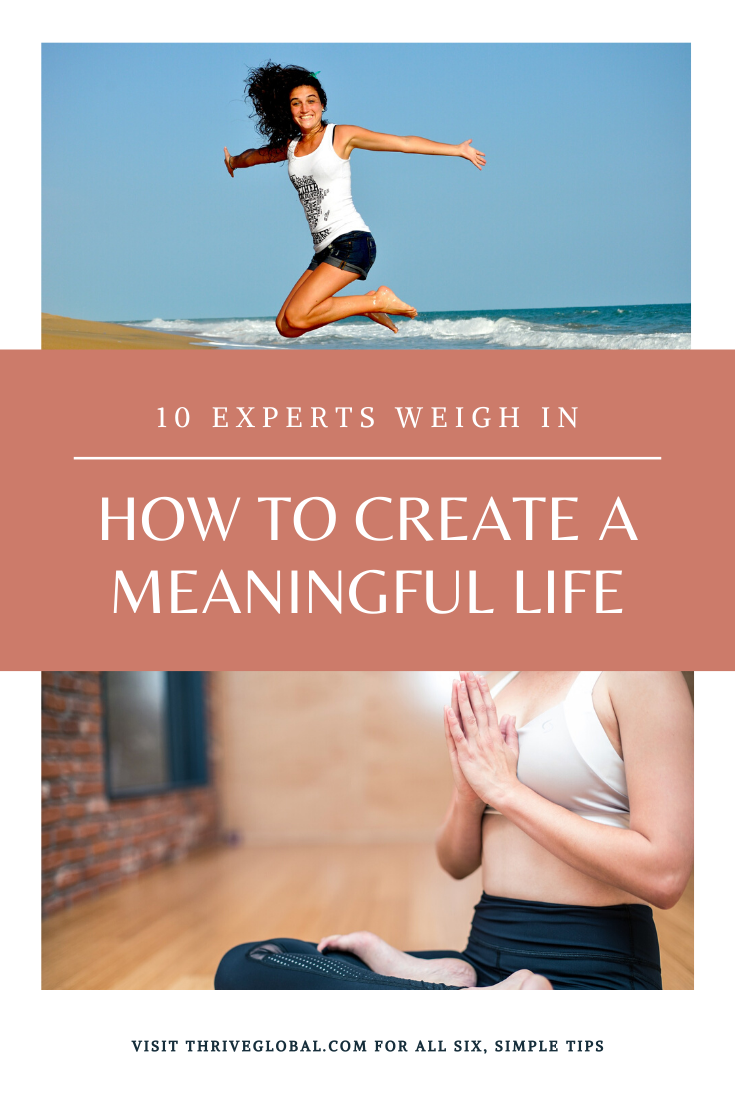Ah, the elusive meaningful life. Something that so many chase, yet so many feel they’ve never achieved. I had the pleasure of speaking to ten experts about their best tips for creating a meaningful life, but before we dive into them, it’s important to recognize that “meaning” is self-defined.
Jeff Agostinelli, a life and business strategist from Next Level Coaching, says that while getting ideas and inspiration for a meaningful life from others is acceptable, “falling into comparison and competition can have you fighting for a life that you don’t actually want.” He goes on to share that you need to understand your values and what’s actually important to you before moving into a practice of “feeding, fueling, expanding, and evolving how those values are expressed in the world” – in other words, a practice of creating a meaningful life.
To better understand those values and what’s authentically important to you, Stacey Hagen, a certified professional coach at Create Coaching & Consulting, recommends taking time to “consider what you value most in your life and what you can’t imagine living without. This can be things like family and friends, and also things like freedom and adventure.”
Tori Autumn, a relationship and certified life coach and author at Tori Autumn Coaching, suggests another approach to achieving the desired and required level of self-awareness. “Commit to 60 minutes a week spending quality time with yourself to figure out who you are outside of your titles dealing with career, family, friends, and social commitments,” she says. “This could mean reading a self-help book, doing the activities you love that make you the happiest, working on something you’ve been putting off, or doing something you’ve been afraid to do because of fear of what others might think.”
While 60 minutes might seem like a big commitment or while deep-diving into yourself might feel uncomfortable, Suzanne Wylde, a holistic coach and alternative therapist, reminds us that “just being good or successful in general is not a substitute for actively engaging with our deep self and feeding it through an authentic experience of life.” So, take the time. Practice the self-reflection. Be comfortable with being uncomfortable, as much of a cliché phrase that is. After all, isn’t a meaningful life worth it?
If you’re unsure exactly where to start with learning more about yourself, check out this list of 50 questions for some serious self-reflection. They cover all areas of your life, from relationships to future goals. Working through a few of them would be a great practice to incorporate into your weekly 60 minutes of self-learning!
After you’ve worked through what “meaning” means to you, then consider adding some of the following tips and practices into your life so you can successfully implement that meaning and build on it, day after day.

Mindfulness and Meditation
Mindfulness and meditation can be powerful ways to create a meaningful life. In fact, Amanda Stemen, a licensed therapist from Fundamental Growth, believes that mindfulness is the only way to create a meaningful life. “I realized how much of my life I’d missed out on trying to avoid pain,” she explains. “I vowed then and there to be as present as possible for everything in my life – the good, the bad, and the ugly – because I didn’t want to be on my deathbed wishing I’d actually lived my life.” Stemen finds beauty and gratitude in being present for those moments and believes that those sensations allow her to find meaning in every experience.
Lindsey Marx, a content strategist from Best Company, shares that she practices meditation to find meaning, as meditation “can relax your body as well as your soul, [so] you are able to think more in perspective.”
Marx isn’t the only one who believes in the power of meditation for creating a meaningful life. Sylvia Guinan, an author and financial adviser, believes that meditation is a great way for connecting with yourself, which is one of her top tips for creating a meaningful life. “We often have two voices vying for our attentions,” she says. “One voice [is] coming from our head telling us to ignore the current situation we are in or a major choice we need to make. Then you have the voice coming from your heart, and it is your connection with spirit or self.”
Guinan goes on to explain how rushing around can prevent us from understanding our inner voice and our intuition, which she claims can be the best guide “if you allow it to be.”
Key Takeaways: Be present and mindful in every moment. Practice meditation. Connect to your inner voice and your intuition.

Develop Your Hobbies
The beautiful thing about hobbies is that there are a million and one of them for you to choose to incorporate into your life. Agostinelli defines hobbies as “any leisure activity that you can get lost in and enjoy.” If you’re struggling for ideas, consider reading, walking, or volunteering as places to start.
Why are hobbies so important? Well, Agostinelli goes on to explain that having “a handful of things you really enjoy doing where you lose your sense of competition and just get lost in the process is extremely rejuvenating for the mind and body.” Beyond the rejuvenation aspect, Kristin Leff, a soul empowerment coach at Lefflove Coaching, claims that having hobbies can bring you “joy and fulfillment” and that “stepping into your playful energy allows you to connect to your inner needs to have fun and have a creative outlet.” Fun, joy, fulfillment, and creativity – those seem like pretty powerful wins!
Key Takeaway: Find something that you enjoy outside of work and practice it regularly.

Love Yourself
Unfortunately, this tip for creating a meaningful life might be easier said than done, but it’s one of the most powerful tips out there. Wylde explains that living a life where you don’t love yourself can cause you to “spend too much energy on trying to forget your deeper needs, appear to be someone else, and distract yourself from a sense of emptiness inside (where instead you should feel comfort and self-love).” Well, that’s great – but how exactly do we learn to love ourselves?
Damon Nailer, the CEO of Kitrill, has some great tips for doing just that: “ensuring you constantly get ‘me time’ where you are all alone so you can decompress and relax; pampering yourself by splurging on you and enjoying guilty pleasures; investing in your personal development, life enhancements, goals, and dreams; and finding your stress relievers so you can release the negativity and pressure that builds up within.” It’s important to note that learning to love yourself isn’t something that’s going to happen overnight. It takes time and daily practice of some of Nailer’s suggested tips, but stay the course. A life of repressed needs and inauthenticity is far worse than putting in the time to learn to love yourself.
Key Takeaways: Learn to love yourself. Practice self-care. Manage your stress. Put yourself first sometimes.

Identify What’s Wrong & Take Steps To Fix It
It seems like a straightforward concept, but sometimes focusing on the overwhelm of “wrong” in our lives can prevent us from taking steps to fix it and improve our lives. Farrah Lollis, a creator at Enjoy Your Life, encourages those around her to “take inventory of the things that make you unhappy and decide what you need to do to change the narrative.” Hagen suggests asking yourself the following questions in order to do so:
- Which of your values is being met in the way you’d like it to be met?
- What values are not being met?
- What small changes could you implement in your life in order to honor those values that have been neglected?
This simple series of questions would be great for a nightly journaling practice or something to consider as you meditate. Regardless of when you incorporate it into your life, make sure that you take the time to dig deep and be honest with yourself about the answers. It’s not about blaming yourself for “letting things get out of hand”; it’s about being analytical with your life so you know where to focus your efforts.
Autumn keeps the following quote by Maya Angelou in the forefront of her mind: “If you don’t like something, change it. If you can’t change it, don’t complain.” She goes on to share that if you’re faced with areas of your life that you simply can’t change, you should certainly reflect on it, “but don’t let it control your thoughts for too long.”
Key Takeaways: Identify what’s not working in your life right now. Take small steps to change them. Don’t get stuck on what you can’t change – including the past.

Allow Emotions Into Your Life
Emotions can be uncomfortable. Frightening. Messy. They can be easy to push aside, ignore, and repress. Agostinelli, though, beautifully claims that “emotions bring color to life.” In fact, he believes that understanding your emotional response and training yourself to have a more positive one is “the single most important ingredient in truly enjoying the fruits of a meaningful life.” Leff backs up Agostinelli’s belief, saying that understanding your emotional patterns can allow you to “navigate through all situations that life brings forward to us.”
Rachel Freemon-Sowers, an emotions strategist, suggests a practice of identifying the three or four emotions you want to feel that day. “I decided that I wanted to feel courageous, abundant, masterful, and free every day,” Freemon-Sowers shares. “These four feelings dictate what I do every day. They are the focus of all of my decisions, behaviors, and outcomes. If what I am doing, being, or interacting does not equal at least one of the feelings above, the answer is ‘no’.” Not only does this practice allow emotions into your life in a positive way, but it uses them as a guide for the actions you’re taking and choices you’re making throughout your day.
Key Takeaways: Understand your emotional response. Allow emotions in your life. Choose how you want to feel every day and make choices that align with that.
If you’re looking to create a meaningful life, define what “meaning” means to you (psst! This list of 50 self-reflection questions can totally help with that!), implement a mindfulness or meditation practice, develop your hobbies, learn to love yourself, allow emotions into your life, identify what’s going wrong, and take steps to fix it. Simple! I’m kidding…sort of. Creating a meaningful life can be done with simple practices and steps, but it’s not necessarily an easy process to undergo. Give yourself grace and allow yourself the time you need to understand yourself and incorporate that meaning into your life.
(If you’d like to share this article on Pinterest, go ahead and use this graphic.)



